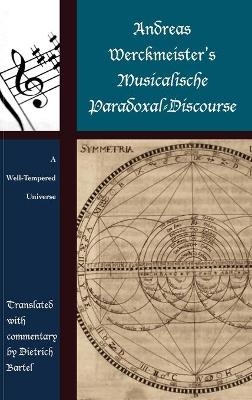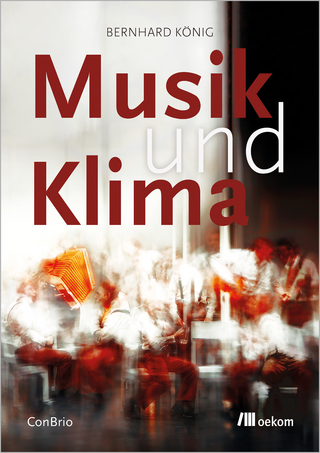
Andreas Werckmeister’s Musicalische Paradoxal-Discourse
Lexington Books (Verlag)
978-1-4985-6634-6 (ISBN)
Andreas Werckmeister (1645 – 1706), a late seventeenth-century German Lutheran organist, composer, and music theorist, is the last great advocate and defender of the Great Tradition in music, with its assumptions that music is a divine gift to humanity, spiritually charged yet rationally accessible, the key being a complex of mathematical proportions which govern and are at the root of the entire universe and all which that embraces. Thus understood, music is the audible manifestation of the order of the universe, allowing glimpses, sound-bites of the very Creator of a well-tempered universe, and of our relationship to each other, our environment, and the divine powers which placed us here. This is the subject matter of the conversation which Werckmeister wishes to have with us, his readers, particularly in his last treatise, the Musicalische Paradoxal-Discourse. But he does not make it easy for today’s readers. He assumes certain proficiencies from his readers, including detailed biblical knowledge, a fluency in Latin, and a familiarity with treatises and publications concerning music, theology, and a number of related disciplines. He writes in a rather archaic German, riddled with obscure references which require a thorough explanation. With its extensive commentary and translation of the treatise, this book seeks to bridge Werckmeister’s world with that of the twenty-first century. Werckmeister wrote for novice and professional musicians alike, an author who wanted to consider with his readers the basic and existential questions and issues regarding the wondrous art of music, questions as relevant then as they are now.
Dietrich Bartel is associate professor of music at Canadian Mennonite University.
Table of Contents
Series Editor’s Foreword
Preface
Part I
Introduction to the Musicalische Paradoxal-Discourse
Werckmeister Biography
Werckmeister Treatises
Contents and Sources of the Musicalische Paradoxal-Discourse
Part IITranslation of the Musicalische Paradoxal-Discourse
Title page and dedicatory comments
Preface
Index and contents of the chapters
Chapter 1An introduction to this work: the division of the musical proportions
Chapter 2A testimonial through mathematics and Holy Scriptures themselves, that the course of the heavens are harmonic
Chapter 3How the mortal body and soul are harmonically created, and furthermore, on the influence of the stars
Chapter 4Why humans find such pleasure in music, and whence composers and musicians arise
Chapter 5As the image of God, humans are to praise the Creator with music. Buildings and eras in scripture are also harmonic wonders of spiritual music.
Chapter 6On the abuse of music, which the authorities could abolish
Chapter 7How the inclination of a people determines its attitude towards music, and how the heathens were so scattered in their views on music
Chapter 8On the music of the early Christians, and the subsequent changes
Chapter 9The great difficulties arising out of solmization and the linear staff-system
Chapter 10Proof that the linear staff system is accompanied by great difficulties
Chapter 11Proof of how everything can be played or sung through the twelve note-names
Chapter 12Further proof, that the linear staff system has many more variants than the twelve note-names
Chapter 13How the temperaments can be examined, and on German tablature
Chapter 14How the chromatic system is to be applied to the tempered keyboard
Chapter 15On the disorder of hymn singing
Chapter 16On the simplicity of old organs
Chapter 17How the musical modes can be differentiated
Chapter 18On the nature and property of the harmonic numerals
Chapter 19On the hidden meaning of the numerals
Chapter 20On the properties of the harmonic numerals, when they themselves are subdivided
Chapter 21On the subdivision of the harmonic numerals
Chapter 22On the properties of the dissonant musical numerals
Chapter 23How the harmonic radical numerals are transformed into a tempered tuning, and of their hidden meaning
Chapter 24A comparison of incorrect tempered tuning with false Christianity
Chapter 25How the temperament can be perfect or imperfect, and how the same can be compared with Christianity
Chapter 26The Lord’s Prayer in the musical proportional numerals
Bibliography
About the author
| Erscheinungsdatum | 31.01.2018 |
|---|---|
| Reihe/Serie | Contextual Bach Studies |
| Übersetzer | Dietrich Bartel |
| Verlagsort | Lanham, MD |
| Sprache | englisch |
| Maße | 161 x 240 mm |
| Gewicht | 404 g |
| Themenwelt | Kunst / Musik / Theater ► Musik ► Musiktheorie / Musiklehre |
| ISBN-10 | 1-4985-6634-0 / 1498566340 |
| ISBN-13 | 978-1-4985-6634-6 / 9781498566346 |
| Zustand | Neuware |
| Informationen gemäß Produktsicherheitsverordnung (GPSR) | |
| Haben Sie eine Frage zum Produkt? |
aus dem Bereich


